AMD Ryzen Threadripper Pro 3955WX Test Configuration
For our testing we used a new platform:
- CPU: AMD Ryzen Threadripper Pro 3995WX
- Motherboard: ASUS Pro WS WRX80E SAGE SE WiFi
- RAM: 8x 64GB Micron DDR4-3200 RDIMMs
- SSD: 4x Samsung 980 Pro 2TB
- NIC: NVIDIA Mellanox BlueField-2 dual 100GbE
The ASUS motherboard we are using we will have a review of in the future. The platform itself is huge and offers a massive amount of onboard connectivity. That extends from PCIe slots to plenty of USB ports, to even having IPMI for out-of-band management. One does not need to put a GPU in this platform and can technically run this like a server using out-of-band management.
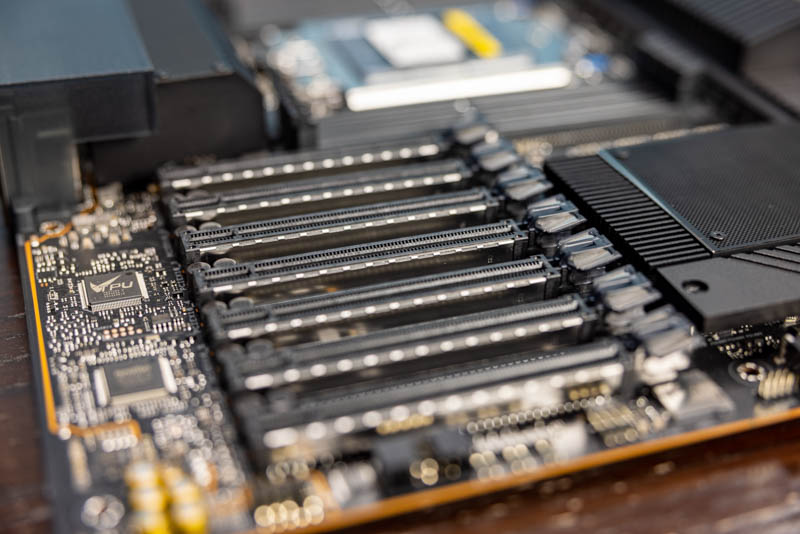
The motherboard comes with a 4x M.2 SSD card, which we used for our SSDs.
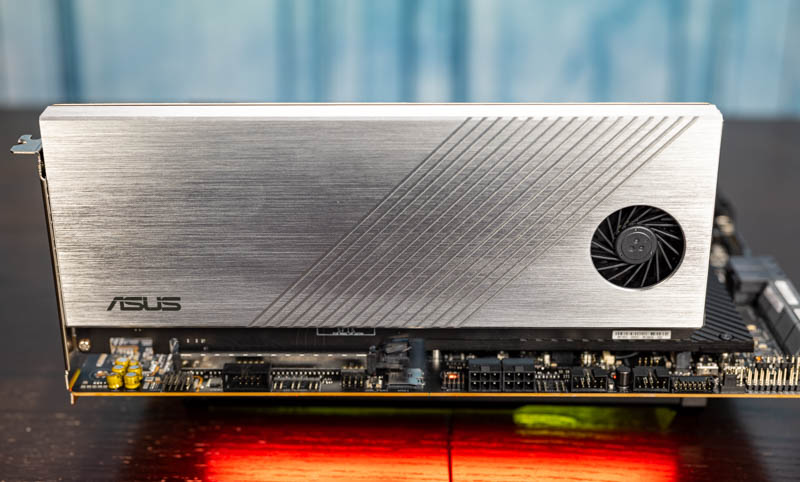
One quick note, this was the platform where we had a Micron DIMM spectacularly fail in. I was running the tests remotely and called Patrick our editor-in-chief to let him know the performance was not good, then a reboot did not work. Upon inspection he found this:
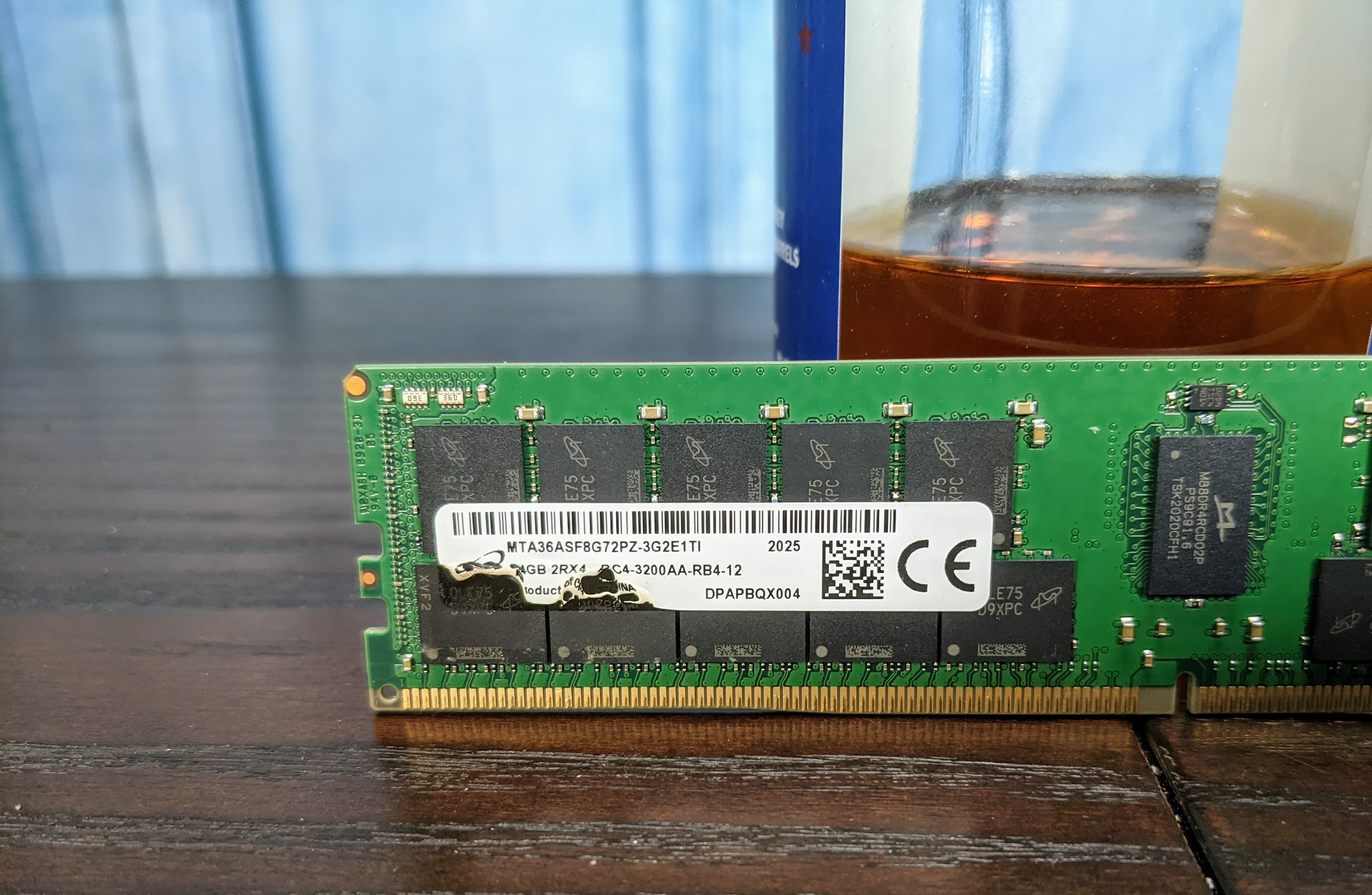
One of the eight Micron DIMMs decided to listen to Incubus’s Pardon Me too many times and attempted to “burst into flames” (really just burn its label.) We ordered a replacement since we could not get a replacement from Micron in time and the replacement is working.
AMD Ryzen Threadripper Pro 3955WX Linux Benchmarks
For this exercise, we are using our legacy Linux-Bench scripts which help us see cross-platform “least common denominator” results we have been using for years as well as several results from our updated Linux-Bench2 scripts. At this point, our benchmarking sessions take days to run and we are generating well over a thousand data points. We are also running workloads for software companies that want to see how their software works on the latest hardware. As a result, this is a small sample of the data we are collecting and can share publicly. Our position is always that we are happy to provide some free data but we also have services to let companies run their own workloads in our lab, such as with our DemoEval service. What we do provide is an extremely controlled environment where we know every step is exactly the same and each run is done in a real-world data center, not a test bench.
We are going to show off a few results, and highlight a number of interesting data points in this article.
Python Linux 4.4.2 Kernel Compile Benchmark
This is one of the most requested benchmarks for STH over the past few years. The task was simple, we have a standard configuration file, the Linux 4.4.2 kernel from kernel.org, and make the standard auto-generated configuration utilizing every thread in the system. We are expressing results in terms of compiles per hour to make the results easier to read:

In this section, we are going to show a few views mostly comparing the Threadripper Pro line, Threadripper, and the higher-end Xeon W parts just to get some sense of scale. Since these charts get somewhat repetitive, we are going to try a format just highlighting our key takeaway for each. One of the more interesting points here is that the extra cache per core layout of the EPYC 7F52 seems to have helped performance significantly here.
c-ray 1.1 Performance
We have been using c-ray for our performance testing for years now. It is a ray tracing benchmark that is extremely popular to show differences in processors under multi-threaded workloads. We are going to use our 8K results which work well at this end of the performance spectrum.
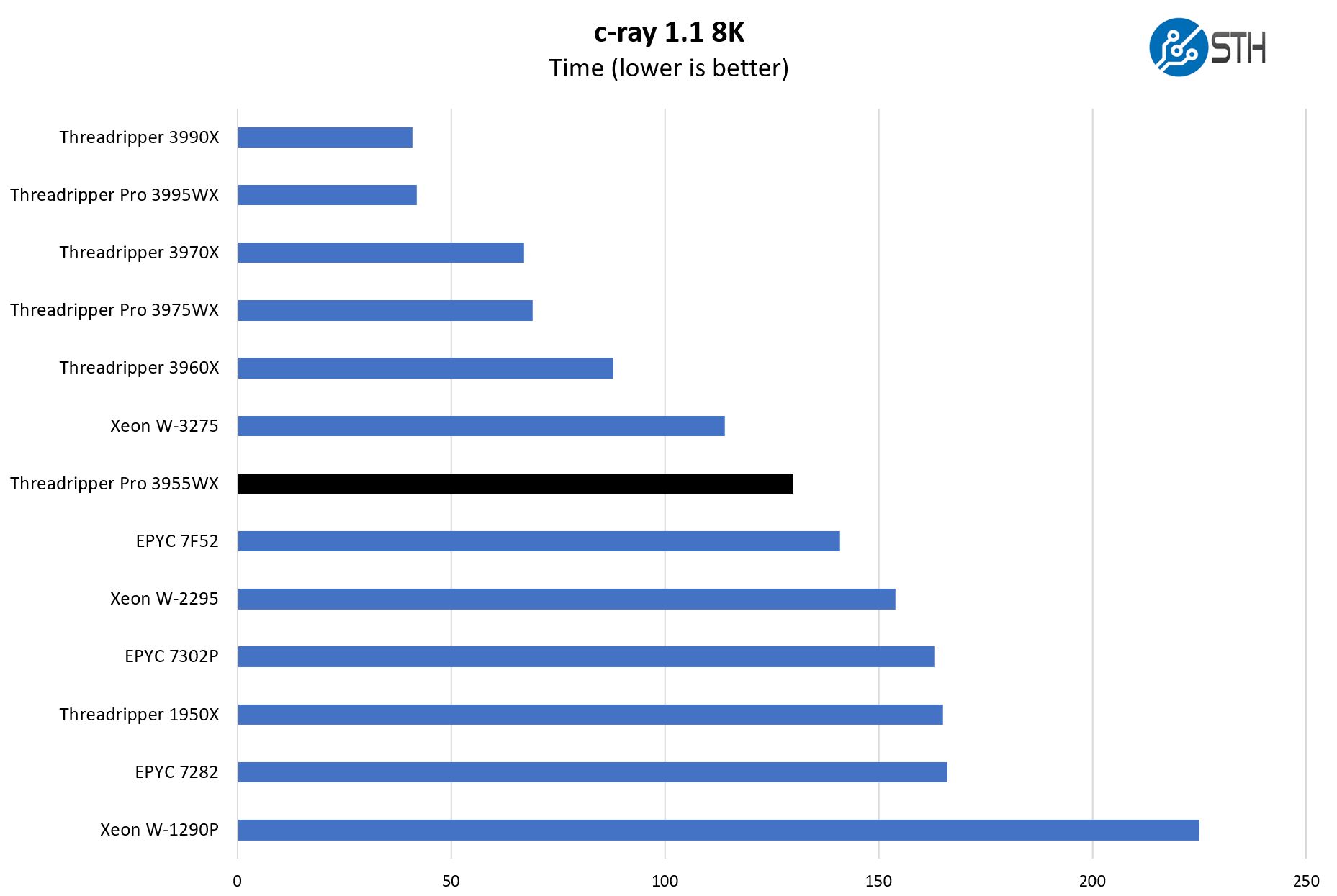
This test is heavily influenced by microarchitecture. AMD does well here for the same reason it does well on Cinebench testing for Windows. One item to note here is that we see a fairly huge gap compared to the first-gen Threadripper 1950X which was also a 16-core part.
7-zip Compression Performance
7-zip is a widely used compression/ decompression program that works cross-platform. We started using the program during our early days with Windows testing. It is now part of Linux-Bench.
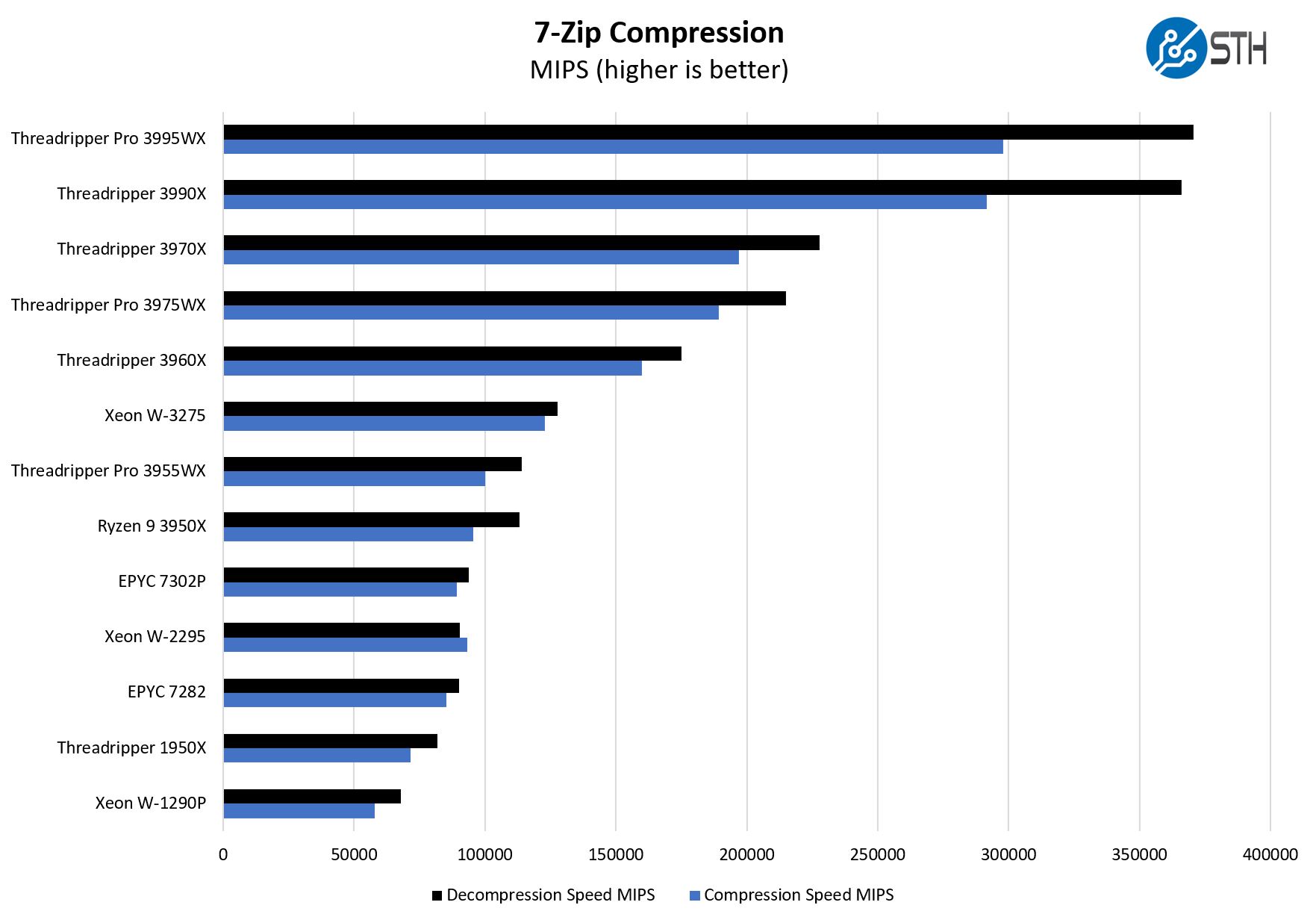
AMD tends to perform well here. We swapped in our Ryzen 9 3950X. The Ryzen 9 series is not a real competitor in this segment, but people will ask about it. That gives some sense of the Zen2 to Zen2 performance when there is not as much inter-die traffic/ memory bandwidth impacting the equation. Again, there is a huge difference in terms of platform connectivity.
NAMD Performance
NAMD is a molecular modeling benchmark developed by the Theoretical and Computational Biophysics Group in the Beckman Institute for Advanced Science and Technology at the University of Illinois at Urbana-Champaign. More information on the benchmark can be found here. Here are the comparison results for the legacy data set:
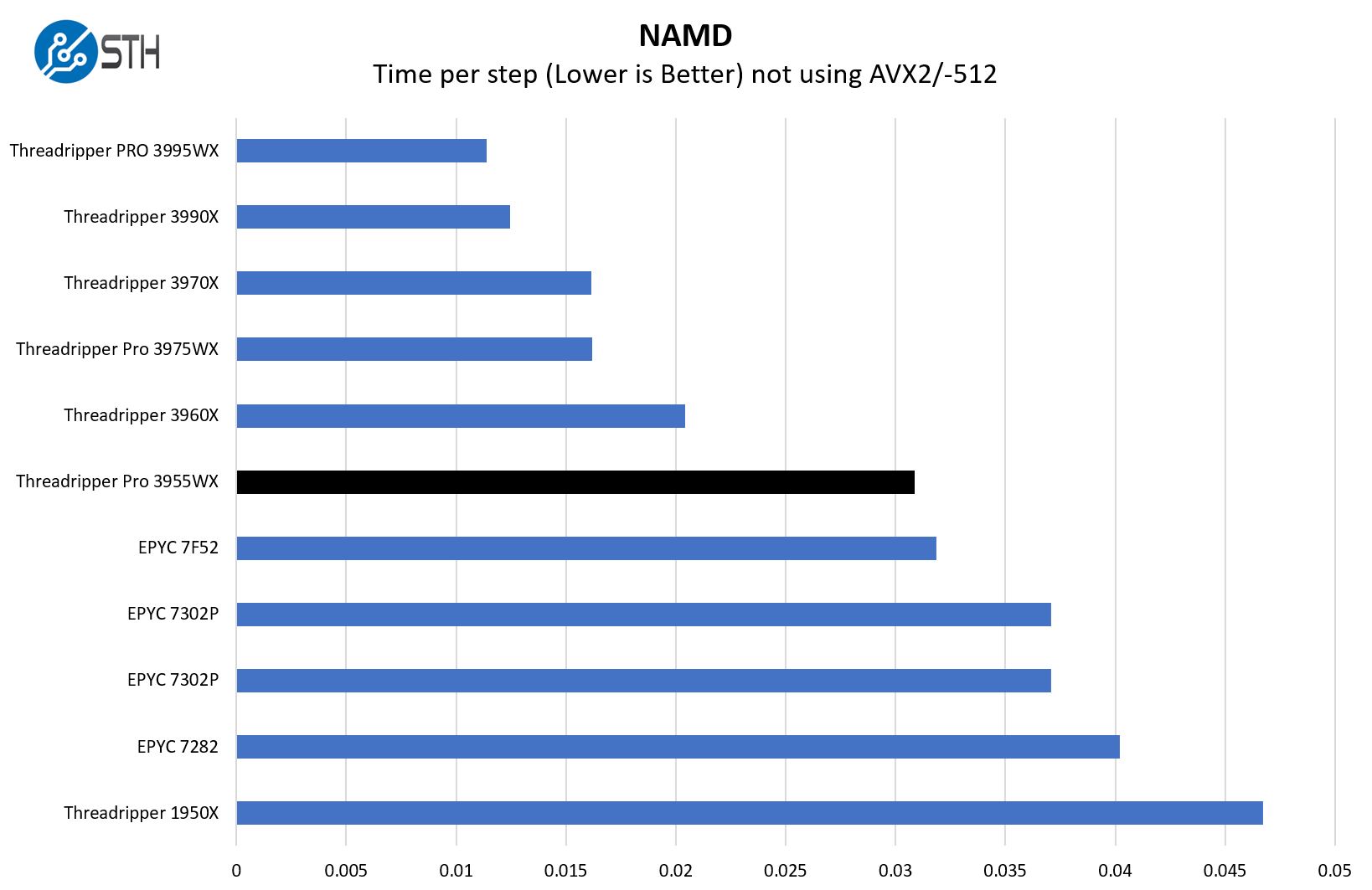
This is a really interesting result. The higher-TDP here seems to have provided some benefit over the EPYC 16-core parts.
Sysbench CPU test
Sysbench is another one of those widely used Linux benchmarks. We specifically are using the CPU test, not the OLTP test that we use for some storage testing.
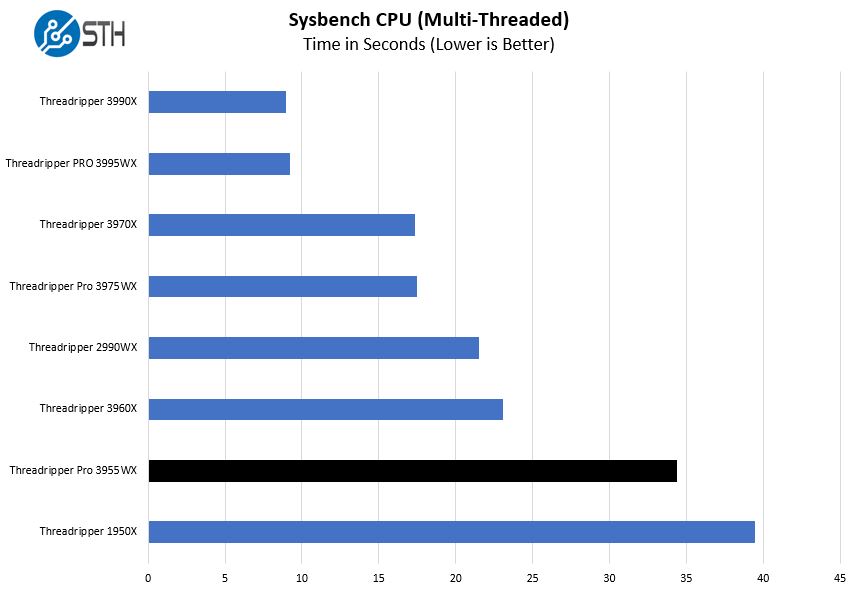
Focusing on the Threadripper series, one can see that we get a nice speed-up over the older generation Zen1 part with Zen2. At the same time, the core counts in Threadripper Pro do not stop at 16 cores so there is a lot of scalability.
OpenSSL Performance
OpenSSL is widely used to secure communications between servers. This is an important protocol in many server stacks. We first look at our sign tests:
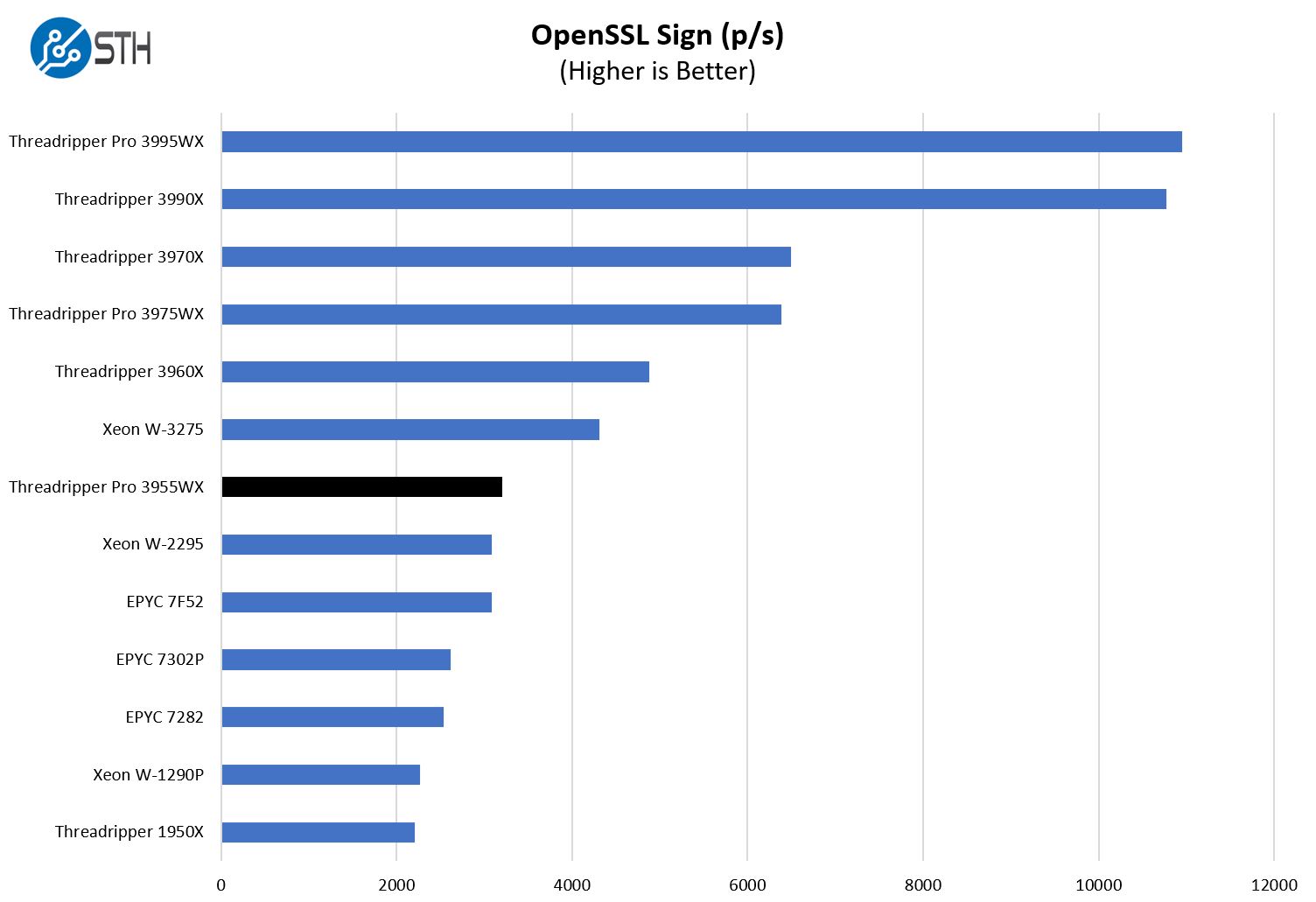
Here are the verify results:
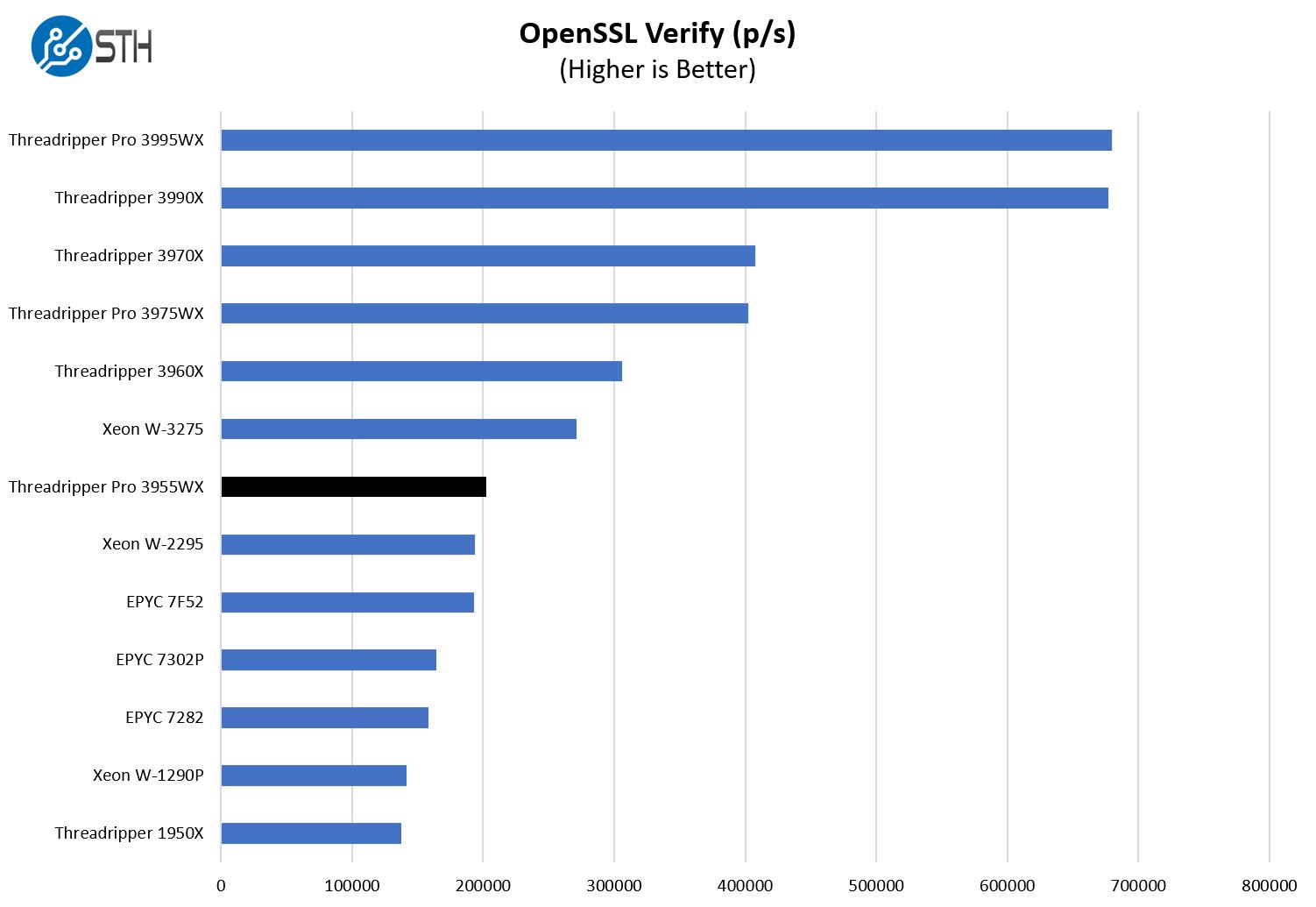
Here we see good results, very close to the Intel Xeon W-2295. To us, the Xeon W-2295 may be the closest competitor for Intel, but it still feels like a strange comparison given the massive platform differences. While Intel has two more cores and a lower TDP, the Threadripper Pro series has a more robust platform. There are some readers who will just want cores, but we suspect a majority of our readers would prefer having the bigger I/O platform.
UnixBench Dhrystone 2 and Whetstone Benchmarks
Some of the longest-running tests at STH are the venerable UnixBench 5.1.3 Dhrystone 2 and Whetstone results. They are certainly aging, however, we constantly get requests for them, and many angry notes when we leave them out. UnixBench is widely used so we are including it in this data set. Here are the Dhrystone 2 results:
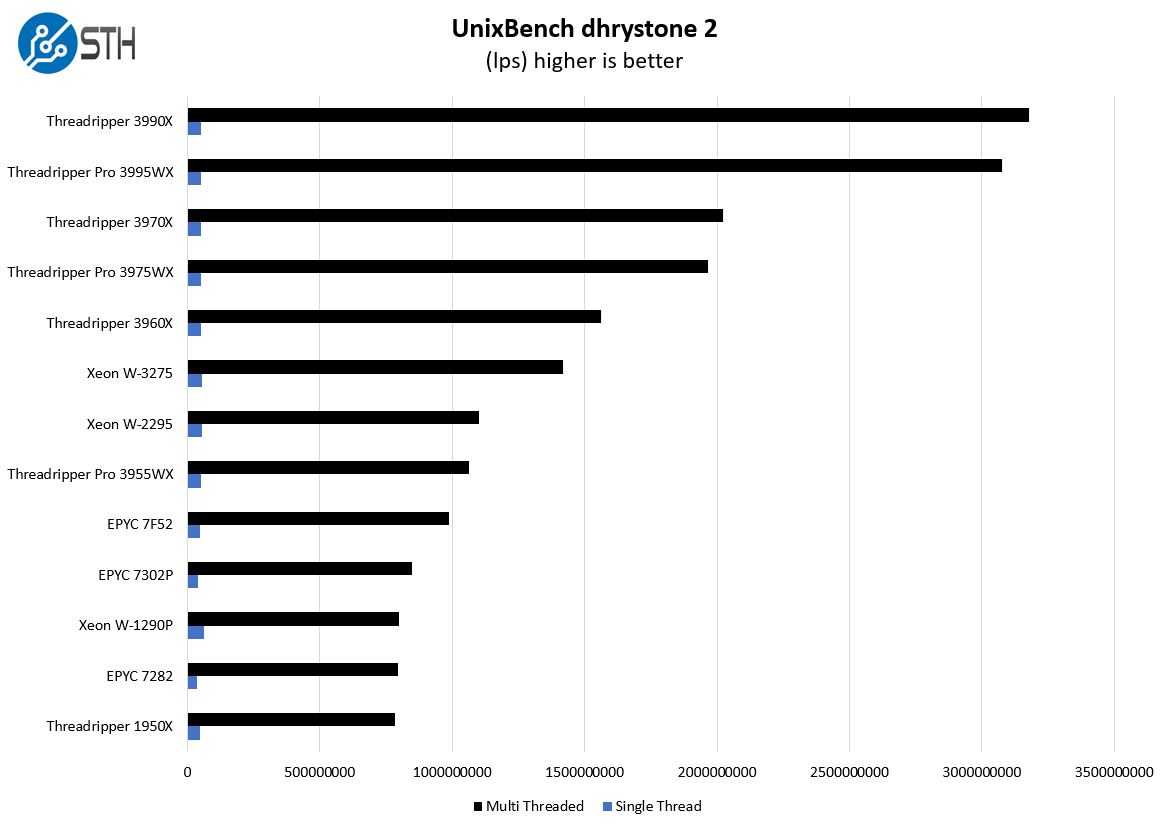
Here are the whetstone results:
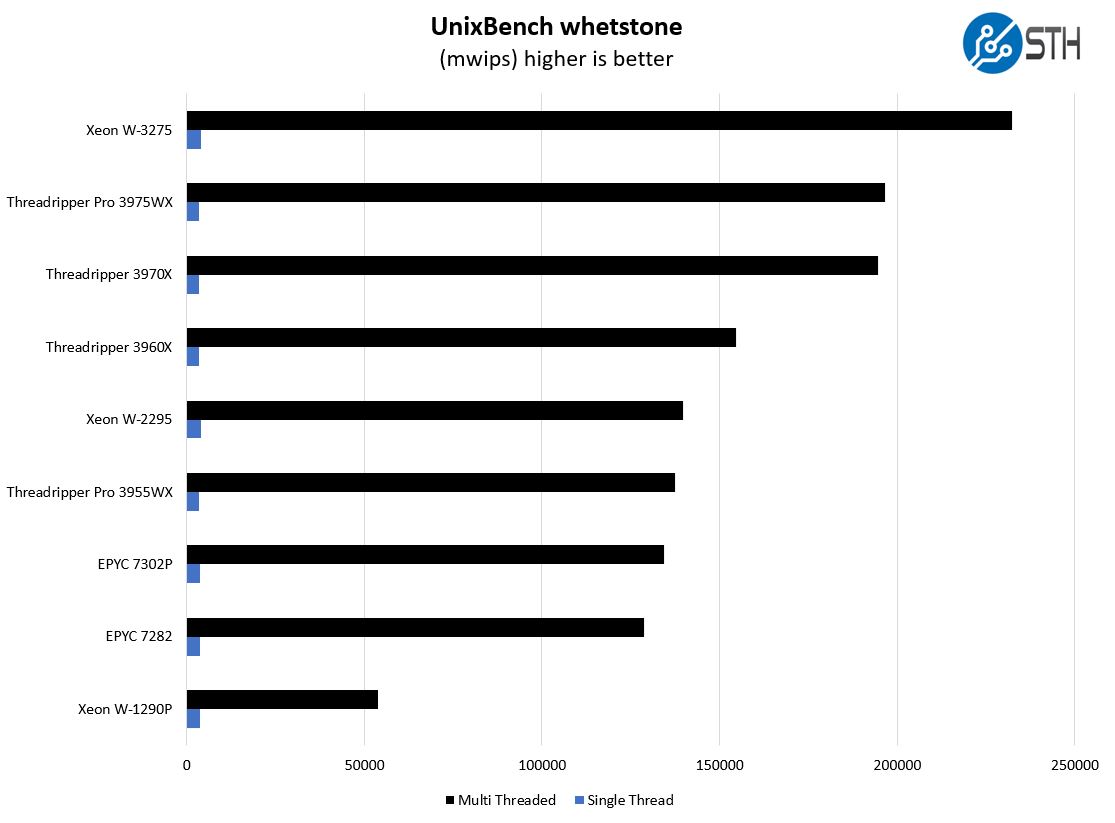
We have certainly hit the point of repetition in this section. Perhaps the big takeaway here is that the Xeon W-2295 and Threadripper Pro 3955WX are very close depending on the test.
Chess Benchmarking
Chess is an interesting use case since it has almost unlimited complexity. Over the years, we have received a number of requests to bring back chess benchmarking. We have been profiling systems and are ready to start sharing results:
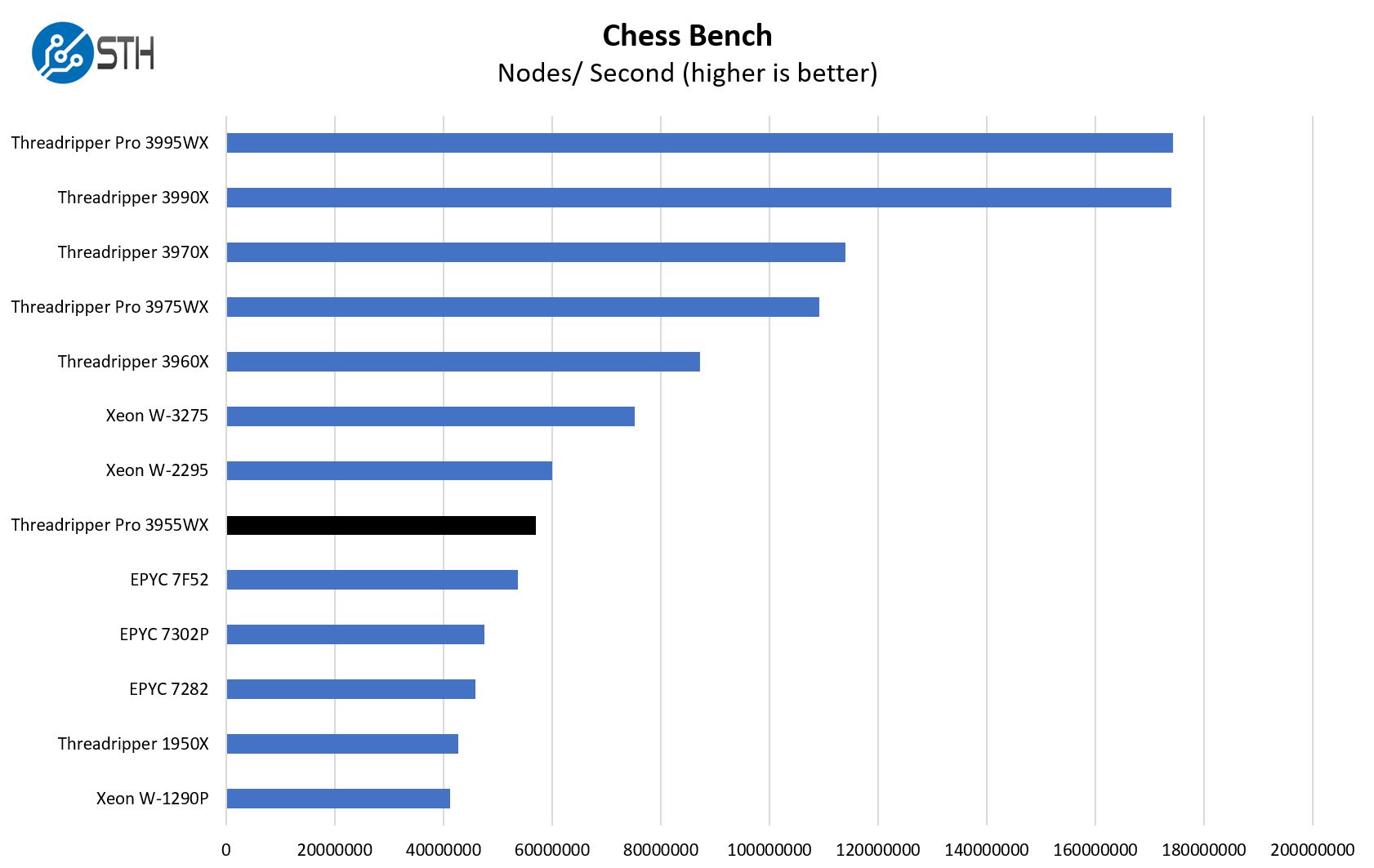
AMD tends to do well here just from raw core counts, but at the 16-core segment, there is more competition. We did want to point out that in a less-cache/ memory bandwidth-sensitive workload the 16-core Zen2 AMD parts have a nice progression to more performance based on TDP.
Next, we are going to discuss the market impact of these chips.




Does this chip suffer from the same half memory bandwidth limitation like the Epyc 7282? From the diagram it’s not immediately clear whether this is 2CCDx2CCX design or 4CCDx1CCX. we can be pretty certain it’s the former, but has this been validated in some way?
Did you have any issues booting Linux on this motherboard? The ASUS support website only shows that it supports Windows